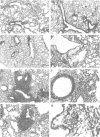Abstract
We examined the contribution of the cytokine transforming growth factor beta 1 (TGF-beta 1) in the inflammatory response and fibrotic reaction in a mouse model of immune-induced lung fibrosis caused by repeated intranasal exposure to heat-killed bacillus Calmette-Guérin (BCG). Mice received 200 micrograms of BCG 3 days/week for 4 weeks, and simultaneous intraperitoneal injections of a monospecific rabbit antiserum against mouse TGF-beta 1 or a preimmune serum (normal rabbit globulin). BCG instillations generated a copious release of antigenic TGF-beta 1 in the lungs at 1, 2, 3 and 4 weeks (up to 15 ng/lungs/mouse). Treatment with anti-TGF-beta 1 antiserum significantly diminished the number of free lung cells recovered by bronchoalveolar lavage (BAL), although the BAL cellular profile was not affected. Moreover, anti-TGF-beta 1 treatment of challenged mice diminished very significantly the total levels of interleukin-1 beta (IL-1 beta) and tumour necrosis factor-alpha (TNF-alpha) in the lungs of animals challenged with BCG. Histological examination and morphometric analysis of Masson's Trichrome-stained sections and measurements of total lung hydroxyproline levels showed a substantial decrease in lung fibrosis and granulomatous response of challenged mice given anti-TGF-beta 1. These data argue for a role for TGF-beta 1 in inducing inflammation and lung fibrosis in response to an immune stimulus.
Full text
PDF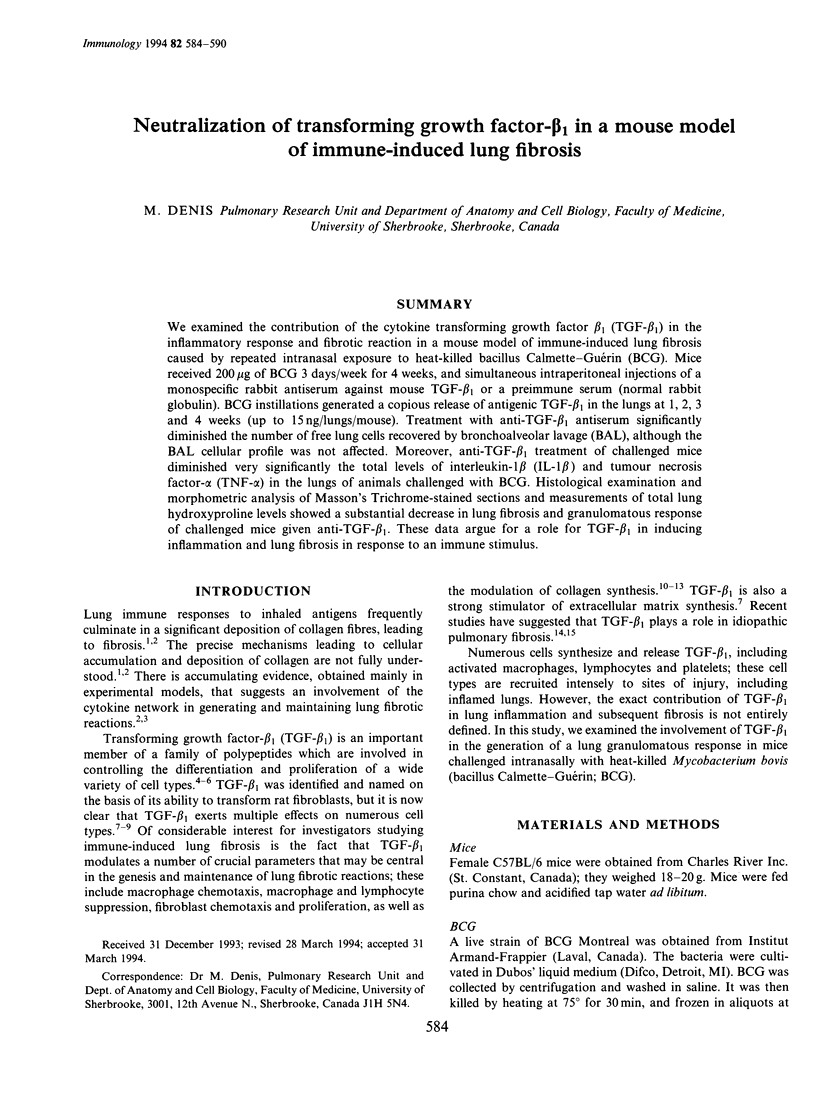
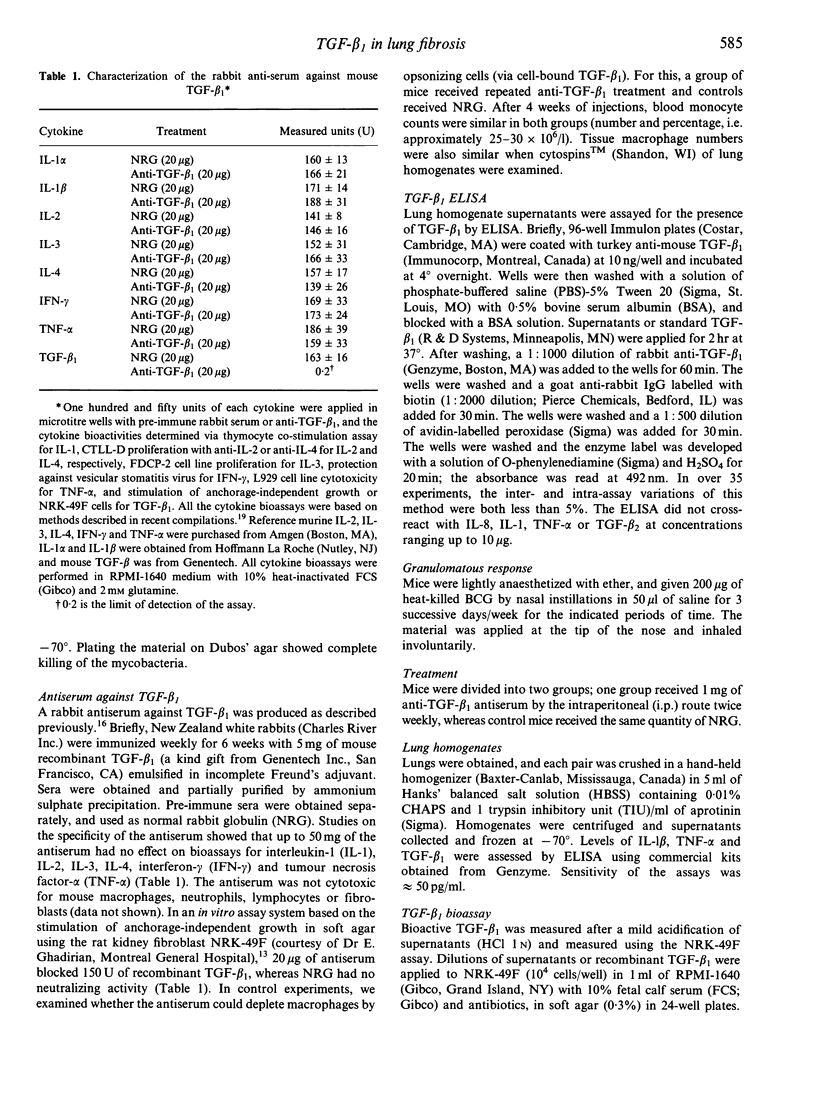
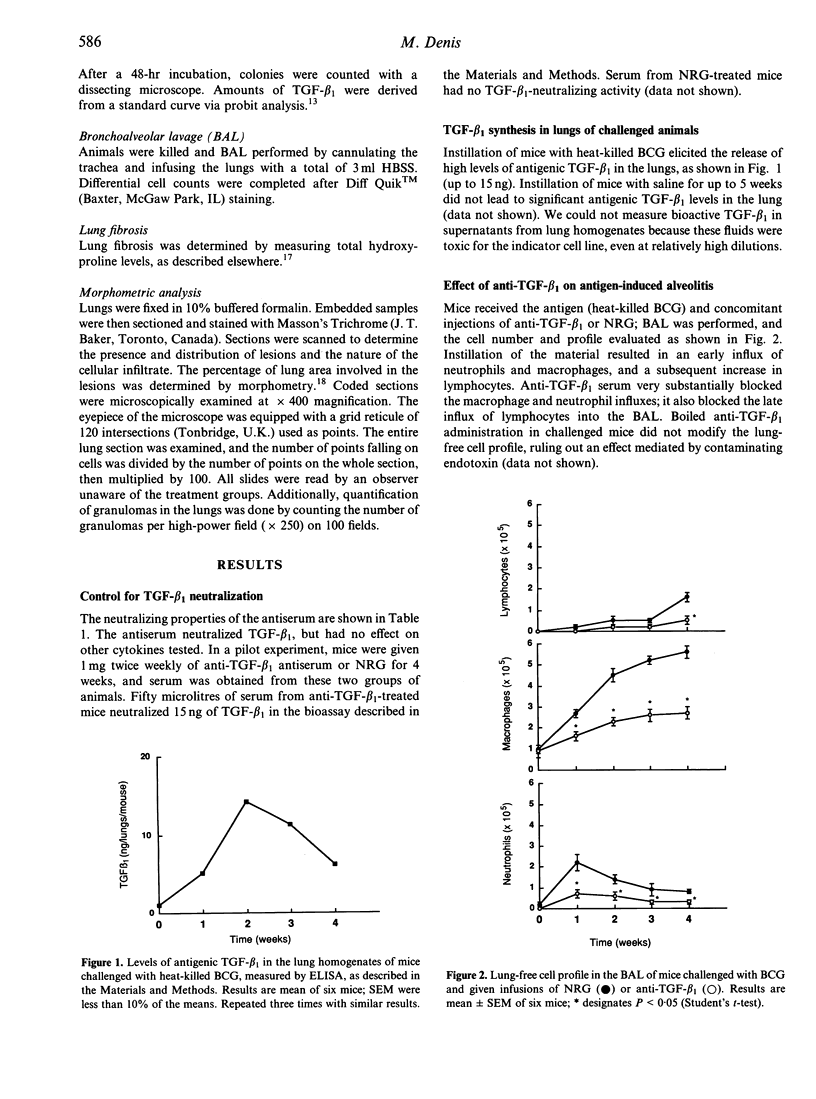
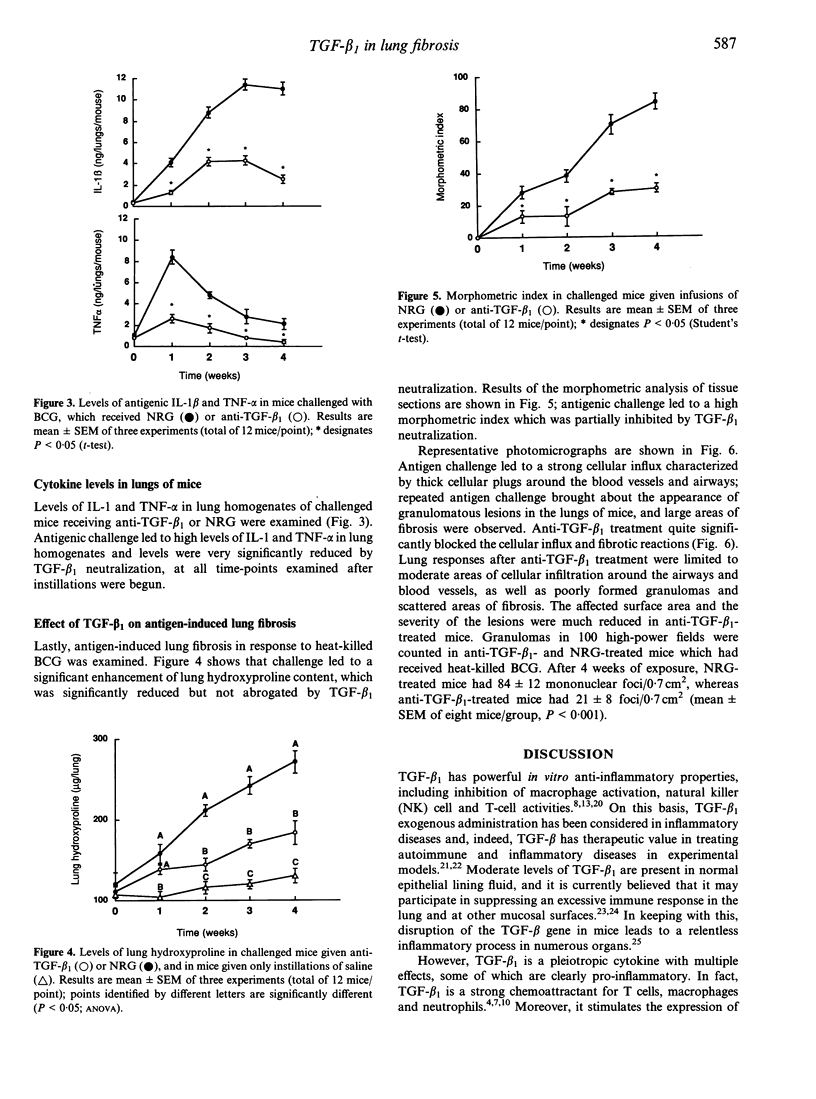
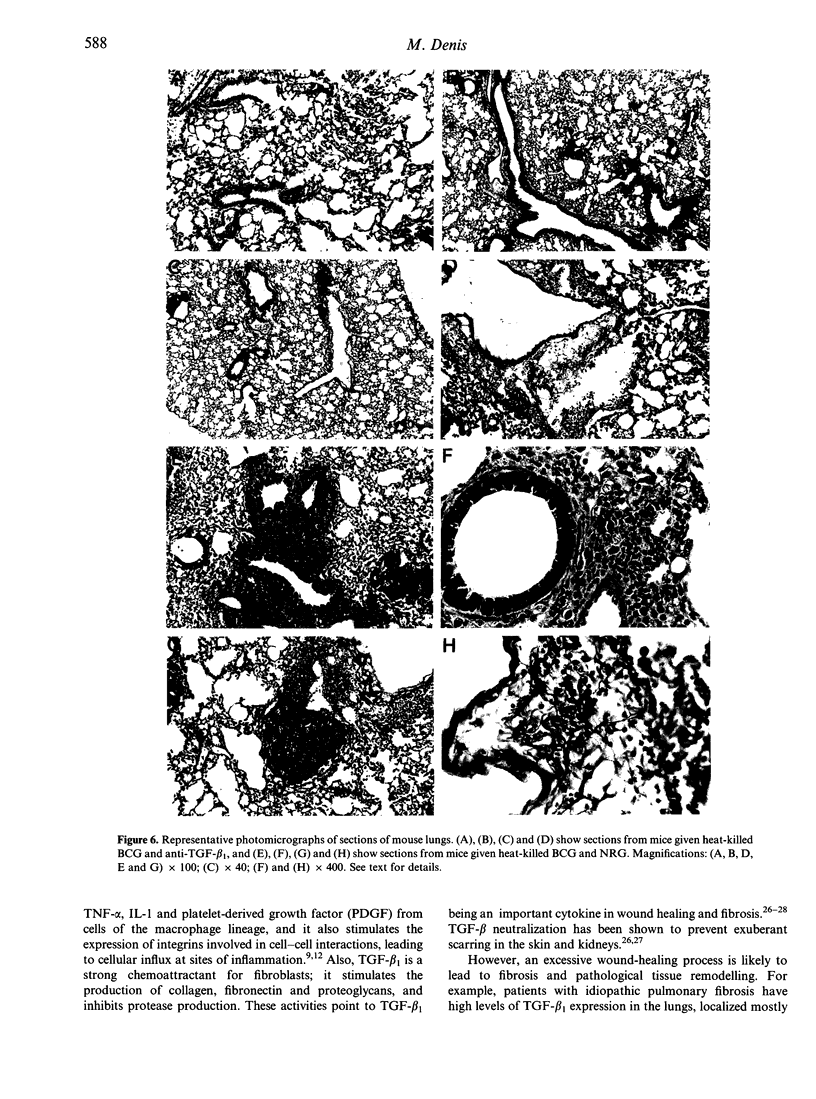
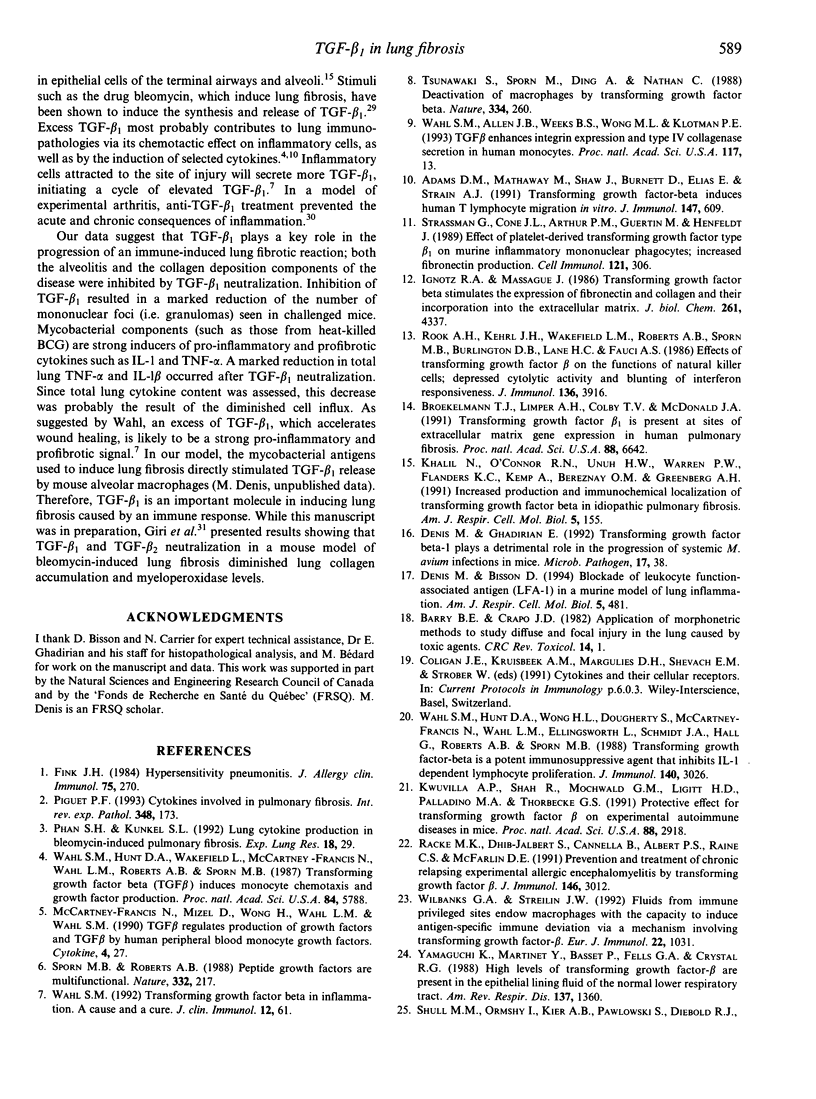
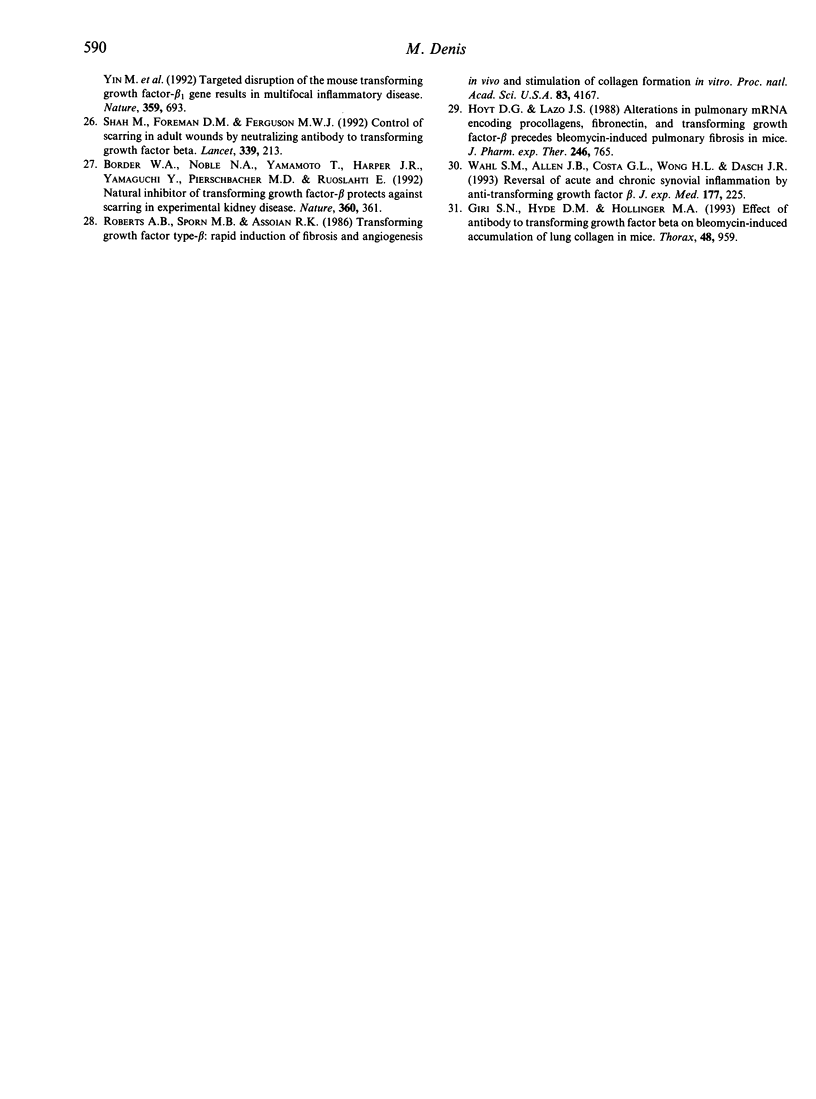
Images in this article
Selected References
These references are in PubMed. This may not be the complete list of references from this article.
- Adams D. H., Hathaway M., Shaw J., Burnett D., Elias E., Strain A. J. Transforming growth factor-beta induces human T lymphocyte migration in vitro. J Immunol. 1991 Jul 15;147(2):609–612. [PubMed] [Google Scholar]
- Barry B. E., Crapo J. D. Application of morphometric methods to study diffuse and focal injury in the lung caused by toxic agents. Crit Rev Toxicol. 1985;14(1):1–32. doi: 10.3109/10408448509023763. [DOI] [PubMed] [Google Scholar]
- Border W. A., Noble N. A., Yamamoto T., Harper J. R., Yamaguchi Y. u., Pierschbacher M. D., Ruoslahti E. Natural inhibitor of transforming growth factor-beta protects against scarring in experimental kidney disease. Nature. 1992 Nov 26;360(6402):361–364. doi: 10.1038/360361a0. [DOI] [PubMed] [Google Scholar]
- Broekelmann T. J., Limper A. H., Colby T. V., McDonald J. A. Transforming growth factor beta 1 is present at sites of extracellular matrix gene expression in human pulmonary fibrosis. Proc Natl Acad Sci U S A. 1991 Aug 1;88(15):6642–6646. doi: 10.1073/pnas.88.15.6642. [DOI] [PMC free article] [PubMed] [Google Scholar]
- Denis M., Bisson D. Blockade of leukocyte function-associated antigen (LFA-1) in a murine model of lung inflammation. Am J Respir Cell Mol Biol. 1994 May;10(5):481–486. doi: 10.1165/ajrcmb.10.5.8179910. [DOI] [PubMed] [Google Scholar]
- Giri S. N., Hyde D. M., Hollinger M. A. Effect of antibody to transforming growth factor beta on bleomycin induced accumulation of lung collagen in mice. Thorax. 1993 Oct;48(10):959–966. doi: 10.1136/thx.48.10.959. [DOI] [PMC free article] [PubMed] [Google Scholar]
- Hoyt D. G., Lazo J. S. Alterations in pulmonary mRNA encoding procollagens, fibronectin and transforming growth factor-beta precede bleomycin-induced pulmonary fibrosis in mice. J Pharmacol Exp Ther. 1988 Aug;246(2):765–771. [PubMed] [Google Scholar]
- Ignotz R. A., Massagué J. Transforming growth factor-beta stimulates the expression of fibronectin and collagen and their incorporation into the extracellular matrix. J Biol Chem. 1986 Mar 25;261(9):4337–4345. [PubMed] [Google Scholar]
- Khalil N., O'Connor R. N., Unruh H. W., Warren P. W., Flanders K. C., Kemp A., Bereznay O. H., Greenberg A. H. Increased production and immunohistochemical localization of transforming growth factor-beta in idiopathic pulmonary fibrosis. Am J Respir Cell Mol Biol. 1991 Aug;5(2):155–162. doi: 10.1165/ajrcmb/5.2.155. [DOI] [PubMed] [Google Scholar]
- Kuruvilla A. P., Shah R., Hochwald G. M., Liggitt H. D., Palladino M. A., Thorbecke G. J. Protective effect of transforming growth factor beta 1 on experimental autoimmune diseases in mice. Proc Natl Acad Sci U S A. 1991 Apr 1;88(7):2918–2921. doi: 10.1073/pnas.88.7.2918. [DOI] [PMC free article] [PubMed] [Google Scholar]
- McCartney-Francis N., Mizel D., Wong H., Wahl L., Wahl S. TGF-beta regulates production of growth factors and TGF-beta by human peripheral blood monocytes. Growth Factors. 1990;4(1):27–35. doi: 10.3109/08977199009011007. [DOI] [PubMed] [Google Scholar]
- Phan S. H., Kunkel S. L. Lung cytokine production in bleomycin-induced pulmonary fibrosis. Exp Lung Res. 1992 Jan-Mar;18(1):29–43. doi: 10.3109/01902149209020649. [DOI] [PubMed] [Google Scholar]
- Piguet P. F. Cytokines involved in pulmonary fibrosis. Int Rev Exp Pathol. 1993;34(Pt B):173–181. doi: 10.1016/b978-0-12-364935-5.50017-1. [DOI] [PubMed] [Google Scholar]
- Racke M. K., Dhib-Jalbut S., Cannella B., Albert P. S., Raine C. S., McFarlin D. E. Prevention and treatment of chronic relapsing experimental allergic encephalomyelitis by transforming growth factor-beta 1. J Immunol. 1991 May 1;146(9):3012–3017. [PubMed] [Google Scholar]
- Roberts A. B., Sporn M. B., Assoian R. K., Smith J. M., Roche N. S., Wakefield L. M., Heine U. I., Liotta L. A., Falanga V., Kehrl J. H. Transforming growth factor type beta: rapid induction of fibrosis and angiogenesis in vivo and stimulation of collagen formation in vitro. Proc Natl Acad Sci U S A. 1986 Jun;83(12):4167–4171. doi: 10.1073/pnas.83.12.4167. [DOI] [PMC free article] [PubMed] [Google Scholar]
- Rook A. H., Kehrl J. H., Wakefield L. M., Roberts A. B., Sporn M. B., Burlington D. B., Lane H. C., Fauci A. S. Effects of transforming growth factor beta on the functions of natural killer cells: depressed cytolytic activity and blunting of interferon responsiveness. J Immunol. 1986 May 15;136(10):3916–3920. [PubMed] [Google Scholar]
- Shah M., Foreman D. M., Ferguson M. W. Control of scarring in adult wounds by neutralising antibody to transforming growth factor beta. Lancet. 1992 Jan 25;339(8787):213–214. doi: 10.1016/0140-6736(92)90009-r. [DOI] [PubMed] [Google Scholar]
- Shull M. M., Ormsby I., Kier A. B., Pawlowski S., Diebold R. J., Yin M., Allen R., Sidman C., Proetzel G., Calvin D. Targeted disruption of the mouse transforming growth factor-beta 1 gene results in multifocal inflammatory disease. Nature. 1992 Oct 22;359(6397):693–699. doi: 10.1038/359693a0. [DOI] [PMC free article] [PubMed] [Google Scholar]
- Sporn M. B., Roberts A. B. Peptide growth factors are multifunctional. Nature. 1988 Mar 17;332(6161):217–219. doi: 10.1038/332217a0. [DOI] [PubMed] [Google Scholar]
- Strassmann G., Cone J. L., Arthur P. M., Guertin M., Herrfeldt J. Effect of platelet-derived transforming growth factor (TGF) type beta 1 on murine inflammatory mononuclear phagocytes: increased fibronectin production. Cell Immunol. 1989 Jul;121(2):306–316. doi: 10.1016/0008-8749(89)90029-4. [DOI] [PubMed] [Google Scholar]
- Tsunawaki S., Sporn M., Ding A., Nathan C. Deactivation of macrophages by transforming growth factor-beta. Nature. 1988 Jul 21;334(6179):260–262. doi: 10.1038/334260a0. [DOI] [PubMed] [Google Scholar]
- Wahl S. M., Allen J. B., Costa G. L., Wong H. L., Dasch J. R. Reversal of acute and chronic synovial inflammation by anti-transforming growth factor beta. J Exp Med. 1993 Jan 1;177(1):225–230. doi: 10.1084/jem.177.1.225. [DOI] [PMC free article] [PubMed] [Google Scholar]
- Wahl S. M., Hunt D. A., Wakefield L. M., McCartney-Francis N., Wahl L. M., Roberts A. B., Sporn M. B. Transforming growth factor type beta induces monocyte chemotaxis and growth factor production. Proc Natl Acad Sci U S A. 1987 Aug;84(16):5788–5792. doi: 10.1073/pnas.84.16.5788. [DOI] [PMC free article] [PubMed] [Google Scholar]
- Wahl S. M., Hunt D. A., Wong H. L., Dougherty S., McCartney-Francis N., Wahl L. M., Ellingsworth L., Schmidt J. A., Hall G., Roberts A. B. Transforming growth factor-beta is a potent immunosuppressive agent that inhibits IL-1-dependent lymphocyte proliferation. J Immunol. 1988 May 1;140(9):3026–3032. [PubMed] [Google Scholar]
- Wahl S. M. Transforming growth factor beta (TGF-beta) in inflammation: a cause and a cure. J Clin Immunol. 1992 Mar;12(2):61–74. doi: 10.1007/BF00918135. [DOI] [PubMed] [Google Scholar]
- Wilbanks G. A., Streilein J. W. Fluids from immune privileged sites endow macrophages with the capacity to induce antigen-specific immune deviation via a mechanism involving transforming growth factor-beta. Eur J Immunol. 1992 Apr;22(4):1031–1036. doi: 10.1002/eji.1830220423. [DOI] [PubMed] [Google Scholar]
- Yamauchi K., Martinet Y., Basset P., Fells G. A., Crystal R. G. High levels of transforming growth factor-beta are present in the epithelial lining fluid of the normal human lower respiratory tract. Am Rev Respir Dis. 1988 Jun;137(6):1360–1363. doi: 10.1164/ajrccm/137.6.1360. [DOI] [PubMed] [Google Scholar]



